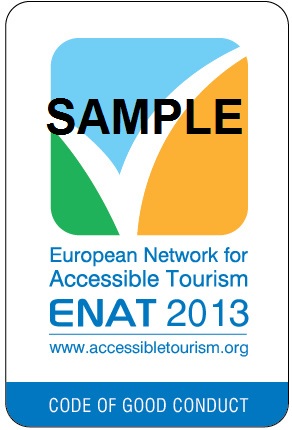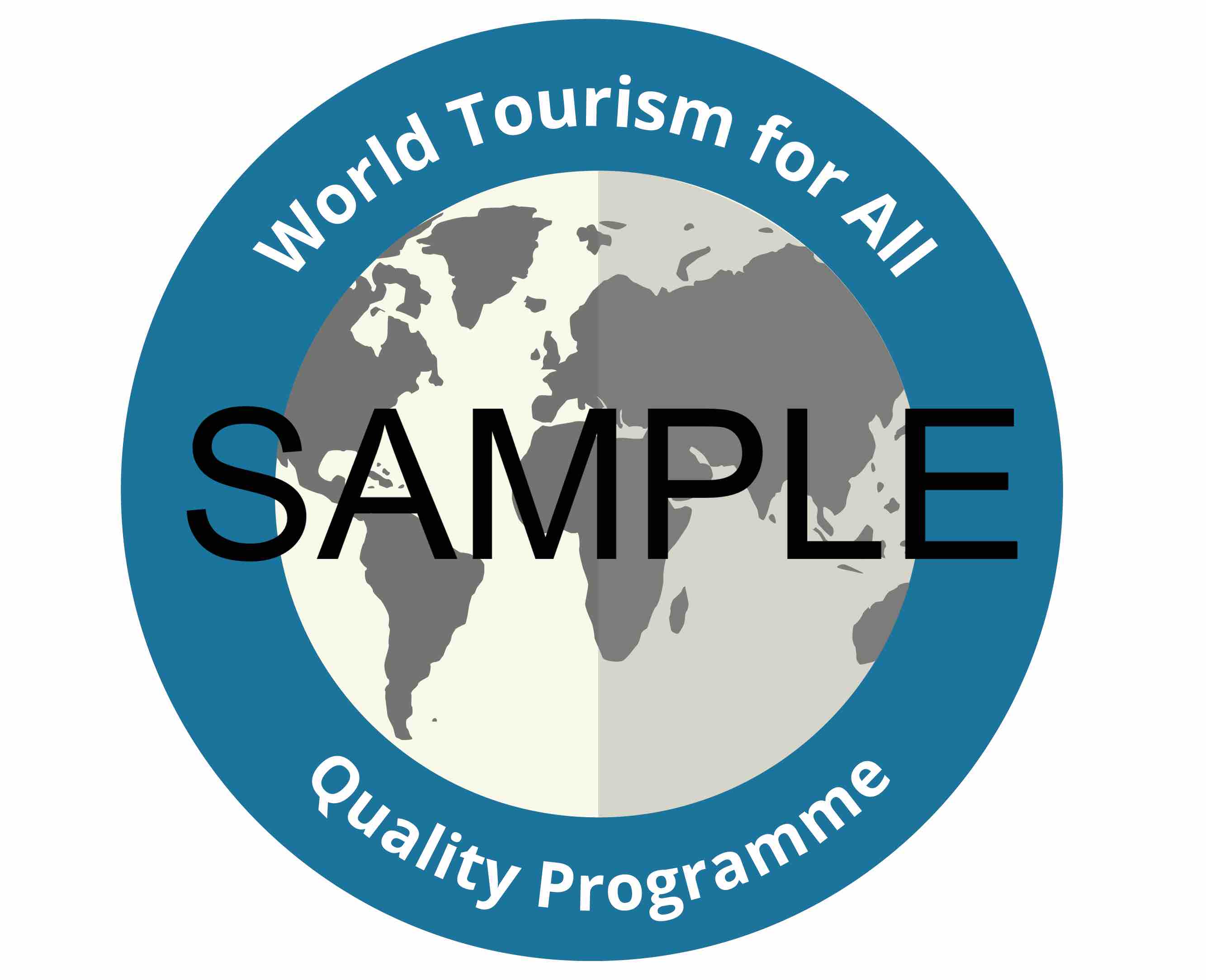ENAT Code of Good Conduct
 Read the ENAT Code of Good Conduct
Read the ENAT Code of Good Conduct
Go to Sign-up page ( - for ENAT Members only)
Go to ENAT Code of Good Conduct Background Information
View list of companies and organisations who have signed the Code of Good Conduct
What is the ENAT Code of Good Conduct?
- Launched in October 2009, the ENAT Code of Good Conduct is a commitment label for tourism businesses and organisations, recognising their efforts to promote accessible travel and tourism.
- It is the first and only international labelling scheme for the promotion of ethical business standards in Accessible Tourism for All.
- The Code consists of 8 guiding principles which businesses and organisations follow, so as to make travel and tourism accessible for all visitors who experience access difficulties. These customers may need better access and services due to disability, long-standing health problems, age-related conditions or other temporary or permanent personal conditions which restrict their access.
- The guiding principles of the Code are based on the objectives of ENAT, (as contained in the Association's statutes), and also on sound and ethical business practices which enhance accessibility, sustainability and the quality of customer service.
- The first 24 businesses received their certificates in 2009.
- Over 100 ENAT members had signed the Code of Good Conduct by the end of 2019.
Why is the Code needed?
- Signing the ENAT Code of Good Conduct is an expression of the commitment a business or organisation makes to its customers and partners to promote and strive for better access to its premises, its services and information.
- The Code is primarily intended for public or private enterprises that directly serve tourists, in Europe and countries around the world. It can also be used by organisations involved in, for example: tourism policy-making; planning, design and management of tourist venues; production or management of tourism facilities and equipment; tourism marketing, education and training and travel and tour services.
- ENAT has launched the Code as a way of enabling customers and businesses to find reliable, trustworthy suppliers in the Accessible Tourism field. These must be people who share ENAT's values and who strive to improve the quality of their services, making tourism more accessible, comfortable and safer for everyone .
Who follows the ENAT Code, and why?
- The Code of Good Conduct is offered only to paid-up ENAT Members, as a supplementary service.There is no extra charge. Signing up to the commitments in the Code is optional. Some members may feel that not all the principles are relevant to their work, for example if they are an educational or professional training institution. Others may feel that they are not ready to commit to all the demands of the Code until they have put certain policies or practices in place.
- ENAT Members who sign the Code undertake a pledge to serve all their customers responsibly and with due care to their access needs. They also agree, as far as possible, to use only those suppliers who adhere to principles of the Code.
-
After they have signed the Code and provided the details of an accessibility resource person in their organisation, ENAT issues the member with a Code of Good Conduct Certificate which can be displayed on their premises, as evidence of their commitment.
The ENAT Code of Good Conduct logo may be used on their website or in printed marketing and advertising material.
What if a member fails to live up to the Code?
- Members who sign the Code of Good Conduct make a public commitment, both to the ENAT association, of which they are a member, and to their customers and business partners. The commitment is based on professional ethics and the integrity of the party which signs.
- With commitment comes the responsibility to follow the Code's principles. In effect, every potential customer, visitor and business partner is a "witness" who can verify whether the ENAT member is meeting the business standards that are stated in the Code.
- The Code requires that members must monitor their own performance, they must have a procedure for handling feedback and complaints, and they must adjust their services, where possible, striving always to improve the accessibility of their offers. Any complaints should be made, in the first instance, to the ENAT member themselves.
- Unresolved complaints about alleged non-adherence to the Code can be referred to the ENAT Secretariat. Complaints received by ENAT will be investigated directly with the member. If a serious breach of conduct has occurred, the ENAT Board may decide to withdraw the Code of Good Conduct certificate and label, restoring these only after the member has implemented corrective measures and signed the Code once more.
What the Code does not do
- It should be noted that the ENAT Code of Good Conduct does not measure an organisation's compliance with statutory accessibility standards, nor does it give any assurance about the actual accessibility of premises, information or services. Possible complaints about these matters should be directed to the business concerned. The Code requires that businesses have a contact person or office which handles access issues, and a procedure for handling customers' complaints.
ENAT's World Tourism for All Quality Programme
 On 26th June 2018 ENAT launched the World Tourism for All Quality Programme for accessible tourism suppliers, incorporating The ENAT Code of Good Conduct as a requirement for those enterprises that seek to receive accreditation under the Quality Programme.
On 26th June 2018 ENAT launched the World Tourism for All Quality Programme for accessible tourism suppliers, incorporating The ENAT Code of Good Conduct as a requirement for those enterprises that seek to receive accreditation under the Quality Programme.
Read the ENAT Code of Good Conduct
The text of the ENAT Code of Good Conduct is reproduced below:
Our Commitment:
1. Recognition of equal rights: We recognise that all people have the right to enjoy tourism, whatever their background or abilities, and we work to promote this right in our activities.
2. Personal attention: We welcome all customers and make it our priority to meet their individual needs.
3. Removing and preventing access barriers: We are committed to planning and carrying out improvements to our infrastructure, products, services and information, using a ‘design-for-all’ approach, in order to remove or minimise access barriers and contribute to sustainable and accessible tourism for all.
4. Improving our knowledge, competences and skills: We follow recognised ”good practices” and guidance for tourism accessibility provided by ENAT, and we are committed to continual staff training which takes into account respect for human diversity and disability awareness, ensuring that all customers are welcomed and served appropriately.
5. Monitoring: Our organisation ensures that customer services are monitored and access is improved as far as possible, within our financial means.
6. Our suppliers: Wherever possible, we work with suppliers who also recognise and respect the principles contained in the ENAT Code of Good Conduct.
7. Complaints handling: Our organisation has a complaints procedure available to customers so that they may report their possible dissatisfaction with our advertising, information, facilities or services. All complaints are handled promptly and fully.
8. Management responsibility: We regard good access for all visitors as part of our wider Social Responsibility. Our management team includes a resource person who is responsible for accessibility matters and who can be contacted by staff and clients.
Name: .................................
Position: ..............................
Email: .............................….
Telephone: ……………………………..
Signature: ...............................................
Date: ..................
The ENAT Code of Good Conduct is exclusive to Members of The European Network for Accessible Tourism non-profit association
Enquiries: Please use the ENAT Contact Page
